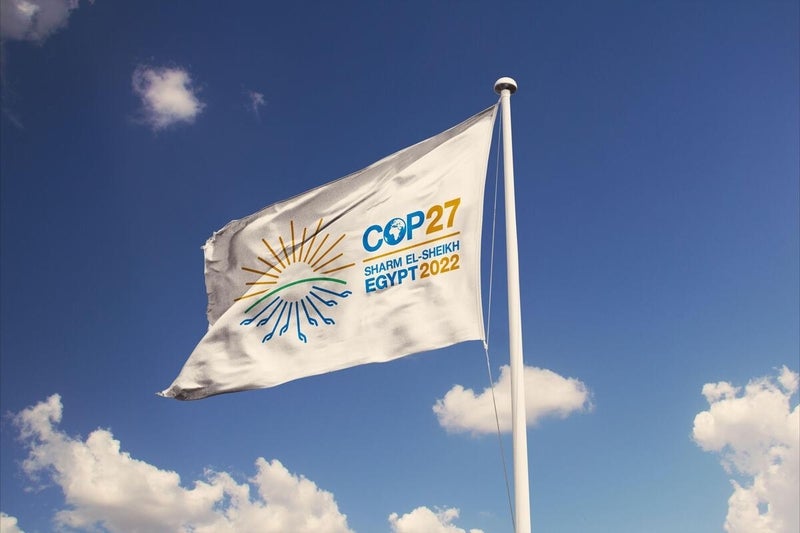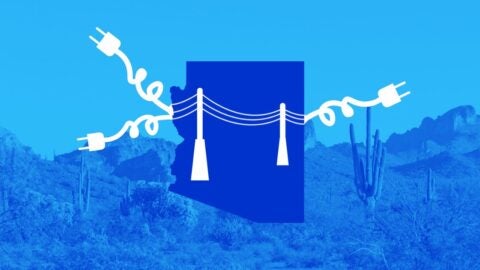
COP 27: The 3 issues we’re watching as the world gathers in Sharm El-Sheikh
Co-authored by Angela Churie Kallhauge, Executive Vice President, Impact; Maggie Ferrato, Manager, Global Climate; and Julia Ilhardt, High Meadows Fellow

It’s been a year since countries and companies announced new climate pledges in Glasgow.
Since then, war and economic disruption, on top of a still-raging pandemic and increasingly destructive natural disasters, have complicated those commitments – and arguably made them even more urgent. The latest report from the Intergovernmental Panel on Climate Change underscores that we have very little time left to meet even the upper limit of the Paris Agreement’s temperature goals.
COP27 is expected to be a “working COP,” meaning we’re likely to see incremental progress on key issues rather than major announcements. But that doesn’t make it any less important. This COP is a chance for countries to take meaningful steps toward tackling the climate crisis.
Here are the three issues to watch in Egypt – both in the negotiations and on the sidelines – to ensure we implement our existing commitments while raising our ambition.
The 3 issues to watch at COP
1. Finance will be front and center in Sharm El-Sheikh.
Developing countries need finance to adapt to the effects of the climate crisis, decarbonize their economies, and secure sustainable economic development for their populations. A successful COP will see action to mobilize adequate resources for vulnerable countries.
As a first step, developed countries must finally deliver on their commitment to mobilize $100 billion per year from 2020 to 2025 to help developing countries address the climate crisis, and step up efforts to provide grant-based finance. Honoring existing commitments is central to restoring and maintaining trust in multilateral efforts to address the climate crisis. Developed countries provided or mobilized only $83.3 billion towards the goal in 2020, with only 34% dedicated to adaptation.
Countries must also meaningfully engage in ongoing negotiations on an updated collective climate finance goal for after 2025, a priority for Egypt’s COP president. Annual climate finance needs are expected to be in the trillions in coming years.
Beyond the finance goals agreed under the UN Framework Convention on Climate Change, it’s imperative that countries explore innovative ways to cooperatively mobilize the scale of public and private finance required, including through Just Energy Transition Partnerships – providing support for domestic decarbonization – and carbon markets.
Building on the Just Energy Transition Partnership established with South Africa at COP26 to help phase out coal, G7 leaders have recently announced similar partnerships with Indonesia, India, Senegal and Vietnam. COP27 is an opportunity to elaborate on these commitments and forge equitable and collaborative solutions for supporting sustainable development.
Carbon markets – compliance and voluntary – can serve as one more tool in the toolbox to mobilize climate investments in mitigation activities in developing countries. Market integrity and leveraging private finance will both be critical priorities at the COP (more on this below).
2. Accountability to commitments made in Glasgow is critical.
The energy around “keeping 1.5C alive” at COP26 generated a multitude of high-profile pledges from countries and companies on everything from phasing out fossil fuels to cutting methane to ending deforestation.
At that time, the International Energy Agency announced that if all the climate commitments were met, the world could hold global temperature increase to 1.8 degrees Celsius by the end of the century – closer to where the world needs to be, but still not enough to avert the worst consequences of climate change.
Countries and companies must show up in Sharm El-Sheikh able to demonstrate that they can meet and exceed the commitments they made.
Focus will also be on companies’ progress towards net zero commitments. Thousands of businesses and jurisdictions, as well as hundreds of financial institutions, have joined the UN-backed Race to Zero campaign. At least one-third of the world’s largest public companies have net zero targets.
Companies must demonstrate what it means to chart and execute on a credible path to net zero that includes reducing their own emissions, advocating for climate policies, and delivering finance through carbon credits to reduce emissions beyond their value chains.
3. Loss and Damage is firmly on the international agenda.
Communities are already experiencing loss and damage from the impacts of the climate crisis that cannot be avoided through mitigation or adaptation. The catastrophic floods in Pakistan this year are just one recent example of the impact the climate crisis has on vulnerable people and countries.
While the precise costs of loss and damage are not known, estimates range from hundreds of billions to trillions in coming decades. At COP26, countries established the Glasgow Dialogue to “discuss arrangements for the funding of activities to avert, minimize, and address loss and damage” among a broad range of stakeholders.
It is therefore encouraging to see initiatives such as the G7’s Global Shield – to be formally launched at COP27 – which aggregates climate risk finance and preparedness activities with the aim of making post-disaster assistance more accessible to vulnerable people and countries.
On the first day of COP27, countries agreed to include consideration of loss and damage funding arrangements on the COP agenda for the first time. This air of cooperation and compromise must be carried throughout the negotiations.
In addition to these three headline-making issues, countries will seek to make progress on other crucial topics, including the Global Stocktake, carbon markets under Article 6, and food systems.
Global Stocktake
COP27 is a midway point for the global stocktake under the Paris Agreement. This process is designed to assess countries’ collective progress toward achieving the mitigation, adaptation, and finance targets outlined in the Paris Agreement. Importantly, it provides an opportunity to identify where and how the world needs to strengthen efforts to combat climate change.
Countries and stakeholders will begin the second technical dialogue of the global stocktake in Sharm El-Sheikh. To make the most of this process, they should focus on sharing concrete and actionable solutions, which would enable stakeholders to learn from each other’s experiences, identify nationally-relevant best practices, and explore areas to enhance international cooperation. The global stocktake should help identify readily available actions with the biggest climate impact, like reducing methane emissions using available technologies, and scaling up nature-based solutions.
A productive dialogue this year would pave the way for a global stocktake outcome in 2023 that raises the ambition of their next round of commitments, including by distilling critical signals on climate action from the volume of information available to decision-makers.
Carbon Markets, Article 6
Decisions are also expected at COP27 on key details to operationalize carbon market mechanisms under Article 6 of the Paris Agreement. This includes elaborating reporting formats and building the infrastructure required to track countries’ use of cooperative approaches. A successful COP will ensure that Article 6 is operationalized in a high-integrity, transparent manner, and does not exclude the use of high-quality credits from natural climate solutions. We can’t achieve the goals of the Paris Agreement without rapidly reducing deforestation and ecosystem degradation —both actions that require massive amounts of resources. Carbon markets are one tool to support countries in taking these needed actions.
Getting Article 6 right could facilitate greater ambition. EDF analysis estimates that high-integrity international carbon market cooperation could enable countries to nearly double their mitigation ambition at no additional cost, provided they reinvest cost savings in additional emissions reductions.
Food Systems
At COP27, countries will continue efforts to make progress on the Koronivia Joint Work on Agriculture (KJWA) process. Established at COP23, the KJWA is the only formal COP mechanism through which agriculture and food security are considered with relation to climate change. Our global food systems are contributing significantly to the climate crisis, with nearly one-third of global greenhouse gas emissions coming from the agricultural sector. Food production is also a major cause of land degradation and loss of biodiversity, and we are seeing increases in the number of people suffering from hunger and malnutrition.
At the same time, our global food systems can contribute to both mitigation and adaptation, with co-benefits for livelihoods, ecosystems, and resilience. In addressing all components of the food systems, including aquatic foods, the KJWA process can elevate the impact of addressing food issues and climate challenges together through a systemic lens. Any new guidance should speak to research, practices, and policy processes that foster cross-sectoral planning and action, and it should facilitate the engagement of farmers and fishers in those processes.
COP27 is an opportunity for countries to move past their differences and focus on implementation of KJWA. Our current approach to providing equitable, sustainable nutrition for all is failing both people and nature.
Facing multiple crises, countries need to do more to tackle climate change—and find solutions that address more than one problem at the same time. And we need to do it while holding countries accountable to their climate pledges.
There’s still time to secure a future in which people and nature can thrive, if we act now.
Countries and companies need to make progress toward achieving their commitments. And developed countries need to be responsive to the needs of developing countries.
A successful COP27 won’t solve these issues, but will get us closer.
Further Resources
- Landing Page: EDF at COP27
- Brief: Leveraging Carbon Markets for Equitable Climate Outcomes












